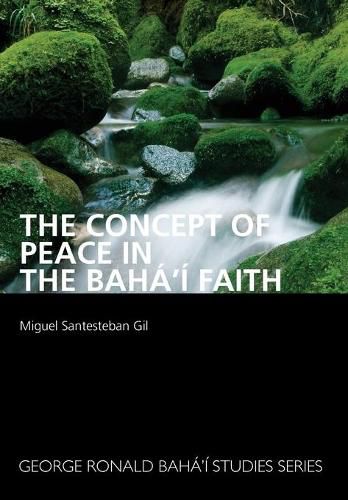Readings Newsletter
Become a Readings Member to make your shopping experience even easier.
Sign in or sign up for free!
You’re not far away from qualifying for FREE standard shipping within Australia
You’ve qualified for FREE standard shipping within Australia
The cart is loading…






This title is printed to order. This book may have been self-published. If so, we cannot guarantee the quality of the content. In the main most books will have gone through the editing process however some may not. We therefore suggest that you be aware of this before ordering this book. If in doubt check either the author or publisher’s details as we are unable to accept any returns unless they are faulty. Please contact us if you have any questions.
Peace is a major defining theme in the writings of the Baha'i Faith, ranking second only to unity, of which it is said to be the outcome, and is often placed before justice.
The fundamental truth of the Manifestations is peace. This underlies all religion, all justice. The divine purpose is that men should live in unity, concord and agreement and should love one another. ‘Abdu'l-Baha
At all times and in all ages of the world, religion has been a factor in cementing together the hearts of men and in uniting various and divergent creeds. It is the peace element in religion that blends mankind and makes for unity. 'Abdu'l-Baha
This book highlights one element in the trilogy of unity, justice and peace that arguably sits at the core of Baha'i beliefs, through an analysis of the relevant texts of Baha'u'llah, 'Abdu'l-Baha, and Shoghi Effendi. By bringing the texts into sharper focus, rather than privileging the sociological or even the historical, it is hoped that the various ideological components of the concept of peace in the Baha'i religion will be brought to sharper relief under a different light. The study explores the logical, anthropological and ethical extensions of the key theme of peace as it moved from one stage to another in the development of a young religion heavily invested in the world.
Framed as a contribution to intellectual history, the question ultimately addressed is: what kind of peace, human nature and general morality did the key authors envisage when they made some of their weightiest proclamations on peace?
$9.00 standard shipping within Australia
FREE standard shipping within Australia for orders over $100.00
Express & International shipping calculated at checkout
This title is printed to order. This book may have been self-published. If so, we cannot guarantee the quality of the content. In the main most books will have gone through the editing process however some may not. We therefore suggest that you be aware of this before ordering this book. If in doubt check either the author or publisher’s details as we are unable to accept any returns unless they are faulty. Please contact us if you have any questions.
Peace is a major defining theme in the writings of the Baha'i Faith, ranking second only to unity, of which it is said to be the outcome, and is often placed before justice.
The fundamental truth of the Manifestations is peace. This underlies all religion, all justice. The divine purpose is that men should live in unity, concord and agreement and should love one another. ‘Abdu'l-Baha
At all times and in all ages of the world, religion has been a factor in cementing together the hearts of men and in uniting various and divergent creeds. It is the peace element in religion that blends mankind and makes for unity. 'Abdu'l-Baha
This book highlights one element in the trilogy of unity, justice and peace that arguably sits at the core of Baha'i beliefs, through an analysis of the relevant texts of Baha'u'llah, 'Abdu'l-Baha, and Shoghi Effendi. By bringing the texts into sharper focus, rather than privileging the sociological or even the historical, it is hoped that the various ideological components of the concept of peace in the Baha'i religion will be brought to sharper relief under a different light. The study explores the logical, anthropological and ethical extensions of the key theme of peace as it moved from one stage to another in the development of a young religion heavily invested in the world.
Framed as a contribution to intellectual history, the question ultimately addressed is: what kind of peace, human nature and general morality did the key authors envisage when they made some of their weightiest proclamations on peace?